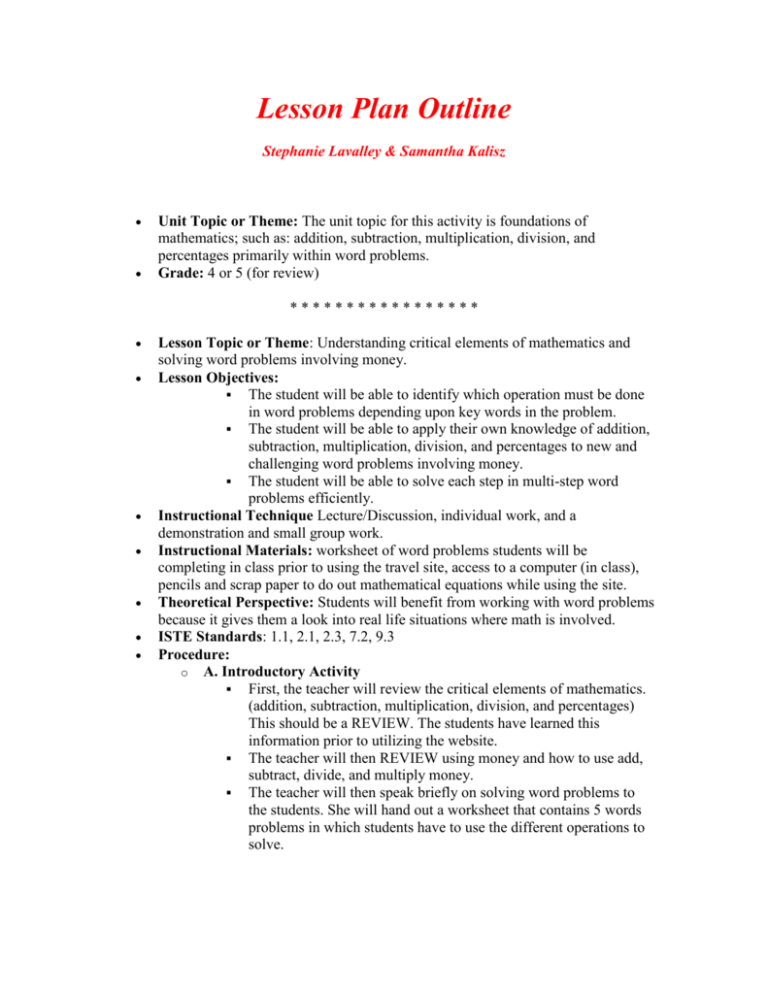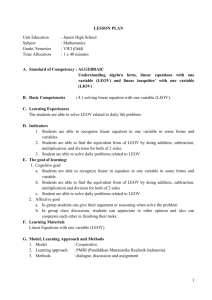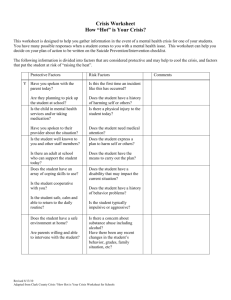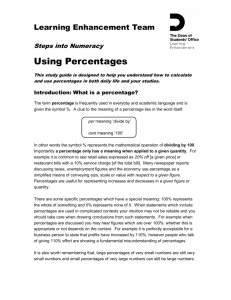Lesson Plan Outline
advertisement

Lesson Plan Outline Stephanie Lavalley & Samantha Kalisz Unit Topic or Theme: The unit topic for this activity is foundations of mathematics; such as: addition, subtraction, multiplication, division, and percentages primarily within word problems. Grade: 4 or 5 (for review) ***************** Lesson Topic or Theme: Understanding critical elements of mathematics and solving word problems involving money. Lesson Objectives: The student will be able to identify which operation must be done in word problems depending upon key words in the problem. The student will be able to apply their own knowledge of addition, subtraction, multiplication, division, and percentages to new and challenging word problems involving money. The student will be able to solve each step in multi-step word problems efficiently. Instructional Technique Lecture/Discussion, individual work, and a demonstration and small group work. Instructional Materials: worksheet of word problems students will be completing in class prior to using the travel site, access to a computer (in class), pencils and scrap paper to do out mathematical equations while using the site. Theoretical Perspective: Students will benefit from working with word problems because it gives them a look into real life situations where math is involved. ISTE Standards: 1.1, 2.1, 2.3, 7.2, 9.3 Procedure: o A. Introductory Activity First, the teacher will review the critical elements of mathematics. (addition, subtraction, multiplication, division, and percentages) This should be a REVIEW. The students have learned this information prior to utilizing the website. The teacher will then REVIEW using money and how to use add, subtract, divide, and multiply money. The teacher will then speak briefly on solving word problems to the students. She will hand out a worksheet that contains 5 words problems in which students have to use the different operations to solve. o o o The students will be given some time (10-15 minutes) to complete these word problems WITHOUT a calculator! (Scrap paper will be available!) The teacher will travel around to different students asking questions and answering their questions. And finally she will go over the correct answers and procedures as a class. (Helpful questions the teacher will ask are: How do you begin to solve a word problem? What are key words in math problems? How will you know to use addition rather than subtraction? Multiplying rather than division?) B. Step-by-step Students will go to their computers and the teacher will log onto the teachers computer.(The actions the teacher takes can be visible to students on a large screen in the classroom) The teacher will then instruct the students to log into the computer and go to Favorites. Under Favorites will be the link to the interactive travel site. (These students are very familiar with these computers- the know the procedure for log in and finding favorites) The students will then be instructed to begin the math travel site. They should be told it is not a race to see who finishes first or who gets all the correct answers. It should be a fun experience learning about word problem use in mathematics and mathematics in the real world. Teacher can say: “Please take your time and complete each problem at your own pace! This isn’t a test, it is simply and activity for you to get more practice working with word problems.” The teacher will provide scrap paper for the students and they can get to work on the site. The teacher will be available for help while students make their way through the website. C. Closure Whole class wrap up: Will include teacher asking questions, such as: How did you like this site? Did you utilize the extra websites for help if you got an incorrect answer? How do you use math in the real world? Would you recommend this site to other students struggling with their word problem solving skills? D. Adaptations for different learners (i.e. non-native speakers, struggling readers or math phobic learners, students with poor study skills) For students with ADD or ADHD the teacher will work with them to focus on the lesson. The teacher will place them close to the teacher when working on the lesson and have a special signal that only the student knows when they are getting off task and need to focus. (like putting up 4 fingers or tapping them on the shoulder) o For English Language Learners the teacher will have to talk slowly and pronounce directions clearly. The students will have the print out to refer to and the teacher will be available during the lesson for all questions. E. Homework There will be no homework given after this lesson because they will have done a worksheet in class and the use of the website. Students will be told they can visit the website at home if they want. Evaluation: A. How/ when will you determine if you have met your objectives? The teacher will keep notes as the students utilize the website. The teacher will write down questions or comments regarding the students as s/he observes the lesson. The teacher will keep the notes and the worksheet on file to reflect back on if necessary. The students will hand in a worksheet, which is done in class in order to demonstrate their knowledge utilizing this website. This will be used by the teacher as a form of assessment. The teacher will be able to review this worksheet and go through their work to determine whether or not the students grasp the assignment objectives. If there are students that do not demonstrate understanding of the assignment the teacher will sit with them one on one or in a small group for further review.




